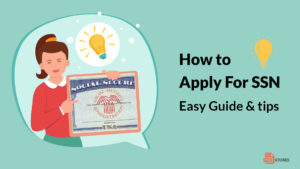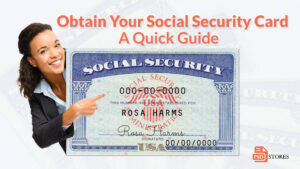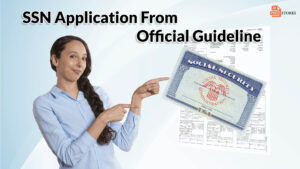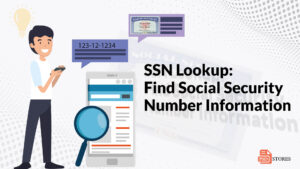In today’s digital world, your Social Security number (SSN) is very valuable. Identity thieves want it badly. The Federal Trade Commission says over 1.4 million Americans lost their identity to thieves in 2021. Most of these cases involved stolen Social Security numbers.
This article will show you how to secure ssn and protect your identity from theft. You’ll get tips on keeping your personal info safe online. This includes not sharing your SSN too much and using strong cyber threat prevention tools. By the end, you’ll know how to keep your SSN and identity secure.
Understanding the Importance of Your Social Security Number
Your social security number (SSN) is a key piece of personal info in the U.S. It’s unique and valuable. But, it’s also a target for identity thieves. Knowing why your SSN matters and the risks of misuse is key for identity protection and personal data security.
Why Your SSN is Valuable for Identity Thieves
Your social security number safeguards are vital. This nine-digit number unlocks a lot of personal info. It includes your credit history, financial accounts, and more. Thieves can use it to open new credit cards, get loans, or file fake tax returns in your name.
Consequences of SSN Misuse and Identity Theft
The effects of secure ssn misuse and identity theft are serious. Victims lose money, see their credit scores drop, and must work hard to fix their credit and reputation. Fixing identity theft takes time and effort, with lots of paperwork and calls to different places.
Keeping your social security number safe is essential. It protects your identity and personal data. By knowing the value of your SSN and the risks, you can take steps to keep your info safe and avoid identity theft.
Secure Your Social Security Number
Keeping your social security number safe is key to protecting your identity and personal data security. Here are some easy tips to secure your SSN:
- Only use your social security number when you really have to, like for taxes or job checks.
- Keep your social security card and any papers with your SSN in a safe place. This could be a locked drawer or a home safe.
- Be careful when someone asks for your SSN. Make sure it’s really needed before you give it out.
- Shred any papers with your SSN on them before throwing them away. This stops others from getting your info.
- Think about using a virtual SSN or privacy number when you can. This is good for online shopping or other things you don’t really need your SSN for.
By following these steps to secure your social security number, you can lower the chance of identity theft. This helps keep your personal data security safe.
Remember, your SSN is very important and should be kept safe. Use these identity protection tips to protect your social security number. This will help keep your money safe too.
Safeguarding Your SSN: Best Practices
Keeping your Social Security number (SSN) safe is key for identity protection and personal data security. To protect your secure ssn and social security number safeguards, follow these best practices. They help limit who knows your SSN and how to store and throw away documents with it.
Limiting Disclosure of Your SSN
Be careful when you share your SSN. Only give it out when you really have to. Here’s how to limit the disclosure of your SSN:
- Ask why they need your SSN and how they’ll use it before you give it.
- Don’t share your SSN unless it’s legally needed, like for taxes or job records.
- Try not to share your SSN with businesses or groups unless you have to.
- Ask if there are other ways to identify you that don’t use your SSN.
Secure Storage and Disposal of Documents
It’s important to handle documents with your SSN carefully. Here’s how to keep your identity protection strong:
- Keep physical documents in a locked drawer or safe.
- Shred documents with your SSN before you throw them away.
- Encrypt digital files and use safe cloud storage for electronic documents.
- Securely delete digital files with your SSN when you no longer need them.
By following these steps, you can lower the chance of identity theft and keep your security of your ssn safe.
Identity Monitoring and Fraud Alerts
Keeping your identity safe is more than just protecting your Social Security number (SSN). It’s also about watching your personal data closely and acting fast if you see any signs of identity theft. Credit monitoring services and fraud alerts with the big credit bureaus are key tools in this fight.
Credit Monitoring Services
Credit monitoring services watch your credit reports for you. They alert you to any odd activity that might mean someone is trying to steal your identity. They check your credit files often for things like new accounts or changes to your accounts without your okay.
By getting these alerts quickly, you can tackle any problems fast. This helps keep your secure ssn and identity protection safe.
Fraud Alerts with Credit Bureaus
Fraud alerts are another strong tool against identity theft prevention. When you set up a fraud alert with Experian, Equifax, and TransUnion, it tells lenders and creditors to be careful. They need to make sure you’re really you before they approve any new credit in your name.
This extra step helps protect your secure ssn and keeps your finances safe.
Using credit monitoring services and fraud alerts helps you stay ahead of identity thieves. These steps are important for keeping your secure ssn and identity protection strong.
Personal Data Security: Protecting Your Digital Footprint
In today’s digital world, keeping your personal data safe is key. This includes protecting your social security number (SSN) and identity. With technology playing a big role in our lives, it’s important to watch your digital footprint. Taking steps to secure your personal data is essential.
One important way to safeguard your SSN and identity is to use strong, unique passwords. Avoid using easily guessable information like birthdays or pet names, and consider using a password manager to generate and store complex, randomized passwords. Also, turning on two-factor authentication adds extra security to your accounts.
- Use strong, unique passwords for all online accounts
- Leverage password managers to generate and store complex passwords
- Activate two-factor authentication on your critical accounts
Sharing personal info online, like your SSN, should be done with care. Limit sharing your SSN to only trusted and necessary entities, and watch out for phishing scams or unsolicited requests for your personal information. Also, make sure your devices and internet connection are secure, even when using public Wi-Fi.
By actively protecting your digital footprint and following best practices, you can lower the risk of identity theft and SSN misuse. Remember, your online actions and shared info can affect your identity protection. Stay alert and keep your personal data secure.
Cyber Threat Prevention: Keeping Your Data Safe Online
In today’s digital world, keeping your sensitive info safe is key. This includes your secure SSN. Cyber threat prevention is vital for protecting your identity and personal data. By following online safety best practices, you can lower the risk of cyber attacks and identity theft.
Strong Passwords and Multi-Factor Authentication
Creating strong, unique passwords is your first defense against unauthorized access. Don’t use easy-to-guess info like your name or birthdate. Instead, mix letters, numbers, and special characters. Also, turn on multi-factor authentication when you can. This adds a strong security layer to your accounts, making it tough for hackers to get in.
Secure Browsing and Public Wi-Fi Safety
Be careful with unsecured public Wi-Fi networks, as they can put your data at risk. Always use a VPN to encrypt your connection and keep your online activities safe. Also, don’t access sensitive info or do financial transactions on public Wi-Fi. Watch out for phishing attempts that aim to steal your personal data.
By using these cyber threat prevention strategies every day, you can greatly improve the personal data security of your secure SSN and other sensitive info. This reduces the chance of identity protection breaches and data encryption problems.
Secure Your SSN at Work and School
Your social security number is very personal and often needed at work and school. It’s key to know how to keep it safe to protect your identity protection and personal data security.
Here are some tips to help you secure your SSN at work and school:
- Limit Disclosure: Share your social security number only when you must. Look for other ways to identify yourself or ask about keeping your SSN safe.
- Secure Storage: If you do share your SSN, make sure it’s kept safe. This can be in a locked cabinet or with personal data security like encryption.
- Shred Sensitive Documents: When getting rid of papers with your social security number safeguards, shred them. Use a cross-cut shredder to stop others from seeing your info.
- Educate Yourself: Learn about your workplace or school’s identity protection rules for secure SSN info.
By using these tips, you can keep your social security number safe. This helps lower the chance of identity theft and other personal data security risks at work or school.
Handling Confidential Documents and Data Securely
Keeping your secure ssn and other personal data safe is key to protecting your identity protection. It’s important to handle and dispose of confidential documents correctly. This helps prevent unauthorized access and misuse of your personal data security.
Encryption and Secure Document Destruction
Using encryption is a great way to protect your data encryption. It makes sure your sensitive information stays safe, even if it’s lost or stolen. This way, your confidential data handling stays secure and out of the wrong hands.
- Use encryption software or cloud storage with strong encryption.
- Make sure to securely destroy any physical documents with your secure ssn or personal data when you no longer need them.
- Invest in a good shredder or use a professional document destruction service for sensitive materials.
By following these steps, you can greatly lower the risk of your personal data security being compromised. This keeps your identity protection safe.
Being proactive and careful with confidential data handling is the best way to protect your secure ssn. It helps you keep control over your personal information.
Identity Theft Recovery: Steps to Take if Your SSN is Compromised
Discovering your Social Security number (SSN) has been stolen can be scary. But, acting fast is key to limit the damage. If you think your SSN has been compromised, here’s how to protect your personal info.
- Contact the Credit Bureaus: Tell Experian, Equifax, and TransUnion right away. Ask for a credit report and put a fraud alert or freeze on your accounts. This helps keep your identity safe.
- Report the Incident: File a report with the Federal Trade Commission (FTC) and your local police. The FTC can give you an identity theft affidavit. Use it to fight any fake accounts or transactions.
- Monitor Your Finances: Keep a close eye on your bank statements, credit cards, and credit reports. Look for anything odd. Think about using a credit monitoring service to stay ahead of thieves.
- Dispute Fraudulent Accounts: Work with your creditors to clear up any fake accounts or charges on your report. This is part of getting your identity back.
- Consider a Credit Freeze: A credit freeze can stop identity thieves from opening new accounts in your name. It’s a strong step in preventing more theft.
Recovering from identity theft takes time, but these steps can help you get back on track. By being proactive, you can protect your personal data and lessen the breach’s effects.
Conclusion: Ongoing Vigilance for Identity Protection
Keeping your Social Security number safe is a big job. In today’s world, where data is always at risk, you must stay ahead. By following the best practices, like being careful with your secure ssn, using identity protection services, and keeping your personal data security tight, you can lower the risk of identity theft.
As new tech comes out, so do new ways for thieves to steal your info. It’s key to keep up with the latest security steps and watch your sensitive info closely. Regularly check your credit, sign up for fraud alerts, and watch your financial and personal records for anything odd. This way, you can catch problems early and avoid big troubles.
Your identity is very precious. By working hard to protect your secure ssn, keeping your identity protection strong, and following good personal data security habits, you can feel safer. Stay alert, informed, and safe. For more visit: https://www.psdstores.com/product-category/ssn/








